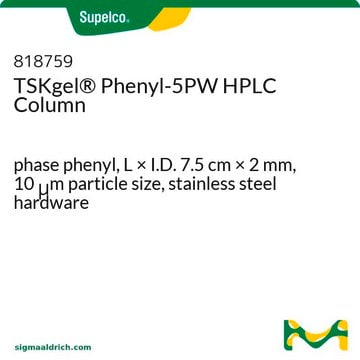8.18759
Tetra-n-butylammonium hydroxide
(20% solution in water) for synthesis
Sinónimos:
N,N,N-Tributyl-1-butanaminium hydroxide, TBAH, Tetrabutylammonium hydroxide
Iniciar sesiónpara Ver la Fijación de precios por contrato y de la organización
About This Item
UNSPSC Code:
12352107
NACRES:
NA.22
Productos recomendados
Quality Level
form
liquid
pH
14 (20 °C in H2O)
bp
102 °C/1013 hPa
density
0.99 g/cm3 at 20 °C
storage temp.
2-30°C
Application
- Hydration structures of lactic acid: Research explored the hydration structures of lactic acid and characterized the ionic clathrate hydrate formed with a biological organic acid anion, utilizing Tetra-n-butylammonium hydroxide in this process (Muromachi et al., 2014).
- Protection of ribonucleosides in RNA synthesis: A study demonstrated the use of Tetra-n-butylammonium hydroxide in the solid-phase synthesis of RNA sequences, particularly for the protection of 2′-hydroxyl groups of ribonucleosides (Cieslak et al., 2013).
- Analysis of cosmetic products: Tetra-n-butylammonium hydroxide is used as a ion-pairing agent in the simultaneous analysis of various organic acids in cosmetic products by enhancing the extraction efficiency during high-performance liquid chromatography (Mikami et al., 2002).
- Determination of calcium dobesilate in human plasma: The compound was employed in the ion-pairing extraction and high-performance liquid chromatography for the determination of calcium dobesilate in human plasma, highlighting its utility in clinical analytical methods (Rona and Ary, 2001).
Analysis Note
Assay (acidimetric): 18.0 - 22.0 %
Due to its specific melting range the product may be solid, liquid, a solidified melt or a supercooled melt.
Due to its specific melting range the product may be solid, liquid, a solidified melt or a supercooled melt.
signalword
Danger
hcodes
Hazard Classifications
Eye Dam. 1 - Skin Corr. 1 - Skin Sens. 1
Storage Class
8A - Combustible, corrosive hazardous materials
wgk_germany
WGK 3
Certificados de análisis (COA)
Busque Certificados de análisis (COA) introduciendo el número de lote del producto. Los números de lote se encuentran en la etiqueta del producto después de las palabras «Lot» o «Batch»
¿Ya tiene este producto?
Encuentre la documentación para los productos que ha comprado recientemente en la Biblioteca de documentos.
Los clientes también vieron
Nuestro equipo de científicos tiene experiencia en todas las áreas de investigación: Ciencias de la vida, Ciencia de los materiales, Síntesis química, Cromatografía, Analítica y muchas otras.
Póngase en contacto con el Servicio técnico

![Disolución de hidróxido de tetra-n-butilamonio in 2-propanol/methanol for titrations in nonaqueous media c[(C4H9)4NOH] = 0.1 mol/l (0.1 N), Titripur®, reag. USP](/deepweb/assets/sigmaaldrich/product/images/217/795/18cba546-7592-4bb4-8b67-0b4b229e0a2f/640/18cba546-7592-4bb4-8b67-0b4b229e0a2f.jpg)










